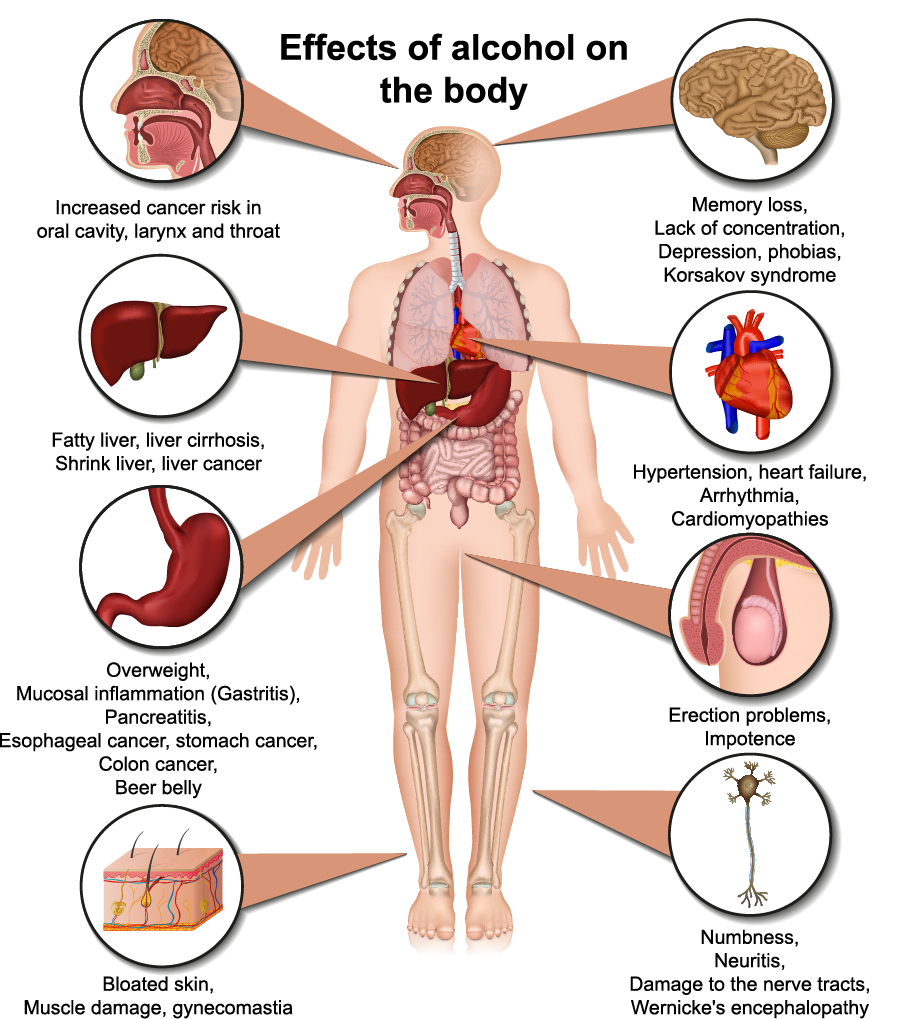Addiction
The psychological and physical inability to stop the consumption of a chemical/drug in spite of its detrimental effect to the consumer is known as addiction. When this habit becomes so important that other important jobs, social functions and daily routine is disturbed by them, it is known as addiction.
Tolerance
It is the requirement of more quantity of a drug in order to get the same desired effect. For e.g. 60 ml of alcohol is used to produce the same mental effect that previously 30 ml would easily produce.
Dependence
The inability to control the desire to consume a substance and experience discomfort on not getting the substance is known as dependence.
Withdrawal
The body and the mind become habituated to the addictive substance and when it is not taken, certain symptoms are experienced which is known as a state of withdrawal. These symptoms can run from being mild to severe in nature.
There are multiple substances that can cause addiction. Alcohol, tobacco, nicotine, LSD, charas, ganja, marijuana, caffeine, opioids etc. We are going to cover some more common ones in order to get an idea of how addiction can affect one’s mind and body.
Alcohol Addiction
The main content of all types of alcohol is known as ethanol. The percentage of ethanol determines the effect that alcohol has on the body. Whiskey is said to have the maximum amount of ethanol which is up to around 40-50%. The least amount is seen in beers which is around 7-10%. Country liquor is considered to be the worst type of alcohol.
Immediate effect
- Double vision
- Forgetfulness
- Headache
- Imbalance while walking
- Feeling of Euphoria
- Nausea / vomiting
- Disturbed thoughts
- Unrestricted speech

Long term effects
- Alcohol can have detrimental effects on the liver, including fatty liver and liver cirrhosis.
- Malabsorption:It causes the malabsorption of various essential nutrients in the body leading to severe deficiencies.
- Digestive system:It causes the corrosion of the esophagus (food pipe), and stomach. This can cause severe acidity, acid reflux, nausea, vomiting and can also lead to gastric(stomach) ulcers and cancer.
- Seizure Risk:withdrawal of alcohol can cause serious side effects like seizures.
- Blackouts:sometimes, alcohol causes one to forget certain intervals of memory. It is nearly like washing out of an entire episode in the mind. This is known as a blackout.
- Sleep disturbances:dependence on alcohol is so strong that one is unable to sleep without the consumption of the same.
- Decreased or loss of appetite:markedly decreased consumption of food occurs as alcohol suffices the appetite.
- Weight gain, hypertension, oral cancer, arrythmias, erectile dysfunction and many more are a part of the long-term effects of alcohol.

Psychiatric disturbances
- Depression:One of the leading causes of depression is alcohol use. It can cause severe depression with suicidal tendencies.
- Psychosis:Alcohol can lead to violent behavior, hallucinations, paranoia.
- Delirium:Patient can become disoriented to time, place and person.
- Erectile Dysfunction:Long term alcohol use can cause difficulty in erection and decreased desire.
Psychiatric disturbances
Depression
One of the leading causes of depression is alcohol use. It can cause severe depression with suicidal tendencies.
Psychosis
Alcohol can lead to violent behavior, hallucinations, paranoia.
Delirium
Patient can become disoriented to time, place and person.
Erectile Dysfunction
Long term alcohol use can cause difficulty in erection and decreased desire.
Nicotine addiction
The active component of tobacco is known as nicotine. It is available in the form of chewing tobacco, cigarettes and bidis in India. It is one of the most common addictions and one of the most difficult ones to quit. It can be as addictive as alcohol, cannabis or cocaine.
Cigarettes or tobacco have nearly 70 other active components which can lead to oral or lung cancer, cardiac disorders and stroke.
Withdrawal of nicotine can cause the following symptoms:
- Intense Cravings for Nicotine
- Tingling in The Hands and Feet
- Sweating
- Nausea and Abdominal Cramping
- Constipation and Gas
- Headaches
- Coughing
- Sore Throat
- Insomnia
- Difficulty Concentrating
- Anxiety
- Irritability
- Depression
- Weight Gain

Symptoms of withdrawal for people who use chewing tobacco are quite similar. They include:
- Depressed Mood
- Trouble Sleeping
- Difficulty Concentrating
- Feeling Restless and Jumpy
- Irritability
- Increased Hunger or Weight Gain
- Slower Heart Rate
FAQs on Nicotine Addiction
Sometimes. If your intake of cigarettes is less then it might help. Though the longevity of the effect is only till you use them. Can lead to relapses.
E-cigarettes also contain nicotine so they can lead to addiction too. The only difference is in the amount of nicotine. The amount differs from brand to brand. E-cigarettes contain less amount of nicotine than normal cigarettes.
Bidis contain more amount of nicotine than traditional cigarettes. Also bidi doesn’t have filters, hence there is inhalation of other toxic substances too like carbon monoxide.
Both contain tobacco. But the difference is the concentration and the method.
In cigarettes concentration of tobacco is more and in Hookah it is less. And again in smoking a cigarette you inhale the smoke directly while in Hookah the smoke you inhale is filtered by the Water (or whatever you've chosen as base).
However, both lead to inhalation of toxic smoke and can both cause addiction.
Cannabis Addiction
Cannabis is one of the most widely misused substances. Commonly referred to as ‘marijuana’ or ‘weed’, this drug is derived from the cannabis plant.
Cannabis use affects your brain, and causes sensations of calmness, mild euphoria, increased appetite and an altered perception of your immediate surroundings and time.
If you begin using cannabis in your teens, the chance of becoming addicted rises to 16%, with the long-term damage to your mental health increasing as greater amounts of the drug are used in order to achieve the same effects.
Short-term effects of cannabis
- Relaxed and positive mood
- Become more talkative and prone to fits of laughter
- Exaggerated feelings of hunger, otherwise known as ‘the munchies’
- Amplified senses such as observing intensely vivid colours
- Feeling as though time has slowed down
- Memory problems
- Feeling sleepy and lethargic
- Feelings of confusion and panic
- Paranoia and anxiety
- Hallucinations
Mental health symptoms
- Confusion and forgetfulness
- Anxiety and paranoia
- Increased risk of developing mental health conditions such as schizophrenia
- Existing mental health problems can be worsened, while medication may not work as well while smoking cannabis
Physical symptoms
- Increased risk of throat and lung disease
- Reduced fertility
- Nicotine addiction can occur if you smoke the drug in joints
Treatment for Addiction Disorders
The treatment part comprises of 3 parts:
De-Addiction
- Relaxed and positive mood
- Become more talkative and prone to fits of laughter
- Exaggerated feelings of hunger, otherwise known as ‘the munchies’
- Amplified senses such as observing intensely vivid colours
- Feeling as though time has slowed down
- Memory problems
- Feeling sleepy and lethargic
- Feelings of confusion and panic
- Paranoia and anxiety
- Hallucinations
De-Toxification
- This refers to a process of supplementation of necessary nutrients to the body along with the removal of residual alcohol.
Rehabilitation
- Motivational enhancement therapy: They are used to maintain the patient’s decision of stopping alcohol.
- Craving Reduction: Use of medications and neuro-stimulation techniques, can help in reducing craving.
- Coping Enhancement: CBT plays a very important role in restructuring a person’s thinking and altering his behavior.

Consultation Timing
Monday - Saturday
Morning: 9:00 -1:00 PM
Evening: 4:00 - 7:00 PM
Follow Us
Get In Touch
Parth Hospital,
3rd Floor Sigma Excellence,
Near Management Enclave,
Opposite Falguni Gruh Udyog,
Ahmedabad, 380015
For Appointment
Visit Us
© 2026 Parth Hospital – All Rights Reserved | Powered By CreativeKatta

